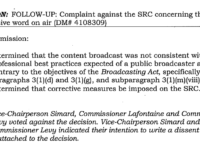Days after Bill C-11 passed in the House of Commons, the CRTC released its decision involving Radio-Canada and the use of the N-word in a broadcast. The decision sparked an outcry in Quebec and raised concerns that the Commission did not feel constrained by the Charter of Rights and Freedoms in its decision. Indeed, given that the majority of the Commission ignored the Charter and freedom of expression altogether, the decision signalled how Bill C-11 could be used to regulate Internet content the CRTC deems contrary to Broadcasting Act policy objectives. Two of the lingering questions with the case involved timing and who had been involved: the complaint had reached the CRTC in 2020, yet the decision was released nearly 18 months later only after Bill C-11 passed the House of Commons. I asked the CRTC for the full commission minutes to better understand who was involved in the case and when the issue was debated and decided. The Commission responded that all of this information was only available through the Access to Information Act. While I find this level of secrecy astonishing – there is no reason for the Commission to not publish who was involved in decisions and to make its minutes publicly available by default – I filed the request.
Post Tagged with: "radio canada"
The Law Bytes Podcast, Episode 134: Monica Auer on CRTC Governance, Content Regulation and the Radio-Canada Decision
Over the past couple of weeks, there has been mounting outrage over a CRTC decision involving Radio-Canada and a broadcast segment from 2020 in which the N-word was used multiple times as part of a discussion of a book that contains the word in its title. That decision has sparked cries of censorship and concerns about the CRTC. Given that Canadian Heritage Minister Pablo Rodriguez and the government want to give the Commission even more power over Internet content as part of Bill C-11, the implications extend beyond this case. Monica Auer, the executive director of the Forum for Research and Policy in Communications, joins the Law Bytes podcast to discuss the latest developments, the broader concerns with CRTC governance, and whether assurances regarding Internet speech safeguards stand up to careful scrutiny.
Unequal Speech: How to Explain the Contradictory Criticism of the CRTC Radio-Canada Decision and Support for Bill C-11
The controversy over the CRTC’s Radio-Canada decision involving its repeated use of the N-word has continued to grow with Quebec-based politicians – including the governing CAQ and the Liberal Party of Quebec – warning of censorship and calling on Canadian Heritage Minister Pablo Rodriguez to reverse the CRTC decision. The outpouring has left me struggling to reconcile the seeming hypocrisy of politicians who warn about the dangers of CRTC speech regulation even as they have been the most ardent supporters of Bill C-11, eager to pass resolutions that call on the federal government to enact legislation empowering the CRTC to regulate user content.
My initial take in a tweet was that this reflects a demand to protect their own speech even as there is a willingness to sacrifice the speech of others in return for a Youtube payoff. On reflection, however, I think there is more at play. Before explaining, it bears mentioning that months of assurances during the Bill C-11 hearings that the CRTC does not engage in speech regulation were patently false.
The Freedom of Expression Wake Up Call: Why the CRTC’s Radio-Canada Ruling Eviscerates the Defence of Bill C-11
Bill C-11’s defenders have typically dismissed concerns about the bill and its implications for freedom of expression as misinformation. When pressed to address the actual substance in the bill, they either insist (wrongly) that the bill excludes user content or, alternatively, that even if it is in, the CRTC is bound by the Charter and requirements to safeguard freedom of expression. The claims about the exclusion of user content from the bill have been exceptionally weak as any reasonable reading of Section 4.2 leads to the conclusion that content is subject to potential CRTC regulation (for example, TikTok has concluded that all videos with music are caught). That regulation can include conditions on “the presentation of programs and programming services for selection by the public”, which means the CRTC can establish regulations on the presentation of content found on Internet platforms (the suggestion that it can’t or won’t watch millions of videos has always been a red herring since it doesn’t need to with a broadly-applicable regulation in place).
CRTC Ruling Signals How Bill C-11 Could Be Used To Regulate Internet Content
Just one week after Canadian Heritage and CRTC officials provided assurances to a Senate committee that the Commission’s regulatory powers over freedom of expression were constrained by the Charter of Rights and Freedoms, the CRTC yesterday released a ruling in which the majority ignored the Charter altogether in regulating content on Radio-Canada. The decision signals how Bill C-11 could be used to regulate Internet content the CRTC deems contrary to Broadcasting Act policy objectives. It also continues a disturbing trend of revelations that have come in the aftermath of Canadian Heritage Minister Pablo Rodriguez cutting off debate to rush the bill through the House of Commons: officials later admitting that the $1B claim of benefits is merely an “illustrative” estimate, CRTC Chair Ian Scott opening the door to indirect algorithmic regulation, and now the release of a decision on content regulation that dates back to November 2020.











